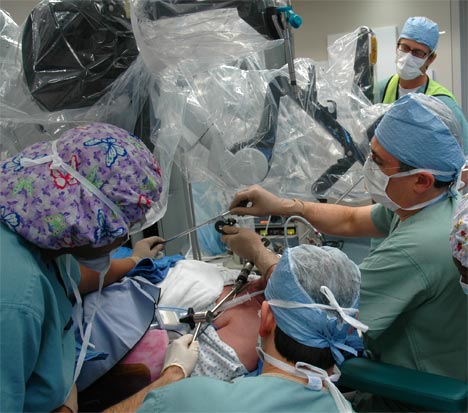Source: Medgadget
Author: Staff

The FDA has given the go ahead for surgeons to use robotic surgery for procedures in the throat and nearby regions by going through the mouth. In effect, this is a new indication for the Da Vinci Surgical System from Intuitive Medical, as it is the only robot of its type that can be used to perform the procedures. The transoral applications of robotic surgery have been developed at the University of Pennsylvania School of Medicine, where a special center was created to study the subject.
Drs. Gregory S. Weinstein and Bert W. O’Malley, Jr. of the University of Pennsylvania School of Medicine’s Department of Otorhinolaryngology: Head and Neck Surgery founded the world’s first TransOral Robotic Surgery (TORS) program at Penn Medicine in 2004, where they developed and researched the TORS approach for a variety of robotic surgical neck approaches for both malignant and benign tumors of the mouth, voice box, tonsil, tongue and other parts of the throat. Since 2005, approximately 350 Penn patients have participated in the world’s first prospective clinical trials of TORS.
Head and neck tumor treatments often involve a combination of surgery, radiation therapy, and chemotherapy. In many cases, surgery offers the greatest chance of cure; yet conventional surgery may require an almost ear-to-ear incision across the throat or splitting the jaw, resulting in speech and swallowing deficits for patients. In comparison, the minimally invasive TORS approach, which accesses the surgical site through the mouth, has been shown to improve long term swallowing function and reduce risk of infection while speeding up the recovery time. When compared to traditional surgeries, after their cancers have been removed successfully, patients have been able to begin swallowing on their own sooner and leave the hospital earlier. TORS outcomes are markedly improved when compared to standard chemotherapy, radiation or traditional open surgical approaches for oropharyngeal cancer.

Leave A Comment
You must be logged in to post a comment.